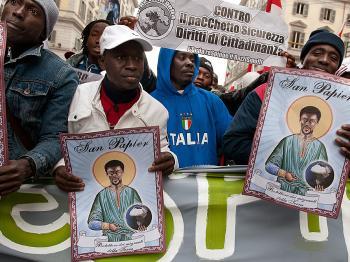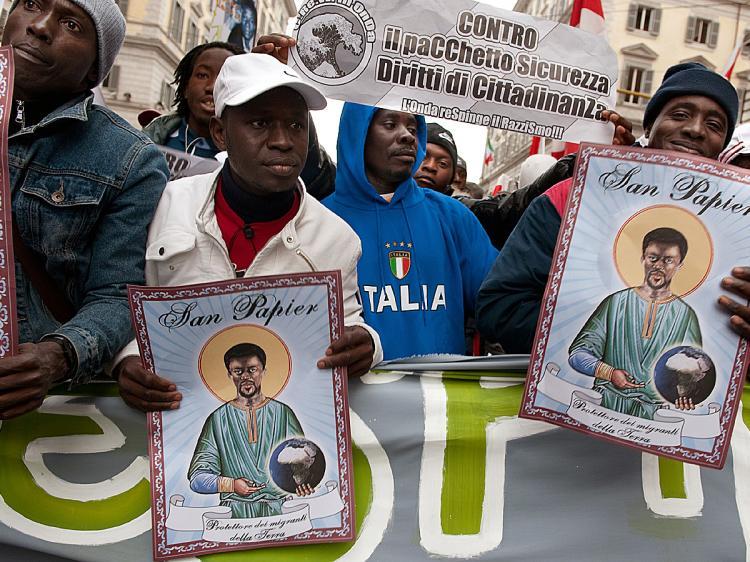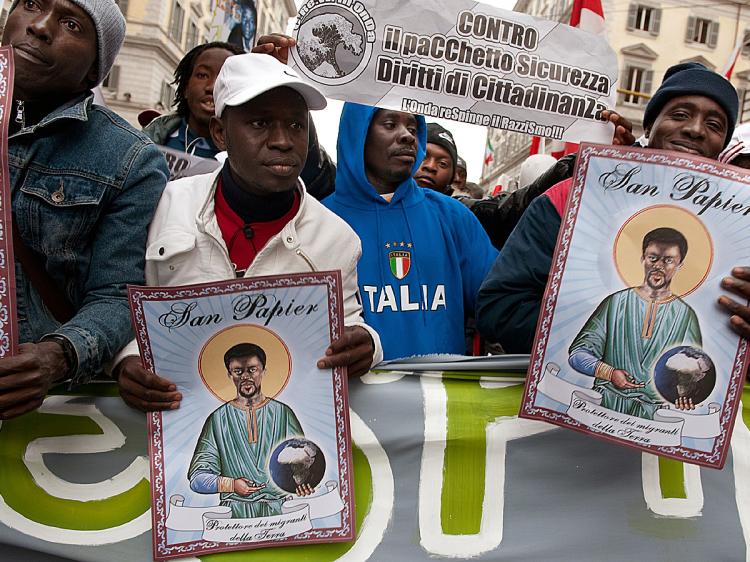ROME, Italy—A new set of rules about how immigrants should be integrated into Italian society was proposed on Feb. 5 by Italian Interior Minister Roberto Maroni and Minister of Labor and Social Policy Maurizio Sacconi, but has been criticized as too simplistic a response, and perhaps a roadblock to citizenship.
The decree would require the applicant for residency to sign an “integration agreement.” They must agree to fulfill their tax debts, be able to speak Italian, join the national health service, and know the constitution. Immigrants will have to score 30 “points” in a series of exams on similar topics over a period of two years. If by then the individual hasn’t accumulated 30 points, they’re granted another year to succeed. After that, if they still don’t make it, the would-be resident is expelled under the proposed new regulations for “being unwilling to integrate.”
“To ensure integration, I suggest things to do to integrate into the community,” the Italian Interior Minister said, summing up his case for the system of measures.
Critics see it as a “marathon trial” and more of a hindrance than a help to migrant integration, designed to deter them from the attempt.
Livia Turco, officer for immigration issues of the center-left Democratic Party, believes that the proposed measures are inadequate when Italian language and culture courses for foreigners are usually held by a few church volunteers, rather than robust, formal courses run by the state.
“Italy is, unfortunately, not Canada,” she said. “If you, Maroni, and Sacconi want to imitate Canada or other countries that have adopted such a system, then first solve these problems and provide times for renewals of permits and courses for language and culture, from public schools,” Turco said in an article in an Italian newspaper.
Whether the new rules proposed by Maroni and Sacconi are able to resolve the problem is still unclear. The issue of immigration, either legal or illegal, is one faced not only by Italy but the EU as a whole, according to an op-ed by Sandeep Gopalan in the Wall Street Journal. Mr. Gopalan writes that recent race riots in Italy are only a taste of things to come, and that “Massive illegal immigration and native resentment are inevitable by-products of the European Union’s broken immigration system.”
Illegal employment is often favored to avoid paying taxes, so immigrants can sometimes be caught in a closed loop—to be officially hired, they need a residence permit, and to get a residence permit, they need the paperwork showing they are renting a house. But taxes on rent income makes landlords prefer to do things under the table. In this scenario, new immigrants to Italian society are at a strong disadvantage, often working in the black, living in squalid conditions in abandoned industrial areas, and hunted by the authorities.
Mr. Gopalan argues that “Italy and other European countries must learn from the American experience that comprehensive immigration reform is essential.”
Interior Minister Maroni said the regulation is on the way to being implemented soon, according to an article in the Italian Adnkronos.
The decree would require the applicant for residency to sign an “integration agreement.” They must agree to fulfill their tax debts, be able to speak Italian, join the national health service, and know the constitution. Immigrants will have to score 30 “points” in a series of exams on similar topics over a period of two years. If by then the individual hasn’t accumulated 30 points, they’re granted another year to succeed. After that, if they still don’t make it, the would-be resident is expelled under the proposed new regulations for “being unwilling to integrate.”
“To ensure integration, I suggest things to do to integrate into the community,” the Italian Interior Minister said, summing up his case for the system of measures.
Critics see it as a “marathon trial” and more of a hindrance than a help to migrant integration, designed to deter them from the attempt.
Livia Turco, officer for immigration issues of the center-left Democratic Party, believes that the proposed measures are inadequate when Italian language and culture courses for foreigners are usually held by a few church volunteers, rather than robust, formal courses run by the state.
“Italy is, unfortunately, not Canada,” she said. “If you, Maroni, and Sacconi want to imitate Canada or other countries that have adopted such a system, then first solve these problems and provide times for renewals of permits and courses for language and culture, from public schools,” Turco said in an article in an Italian newspaper.
Whether the new rules proposed by Maroni and Sacconi are able to resolve the problem is still unclear. The issue of immigration, either legal or illegal, is one faced not only by Italy but the EU as a whole, according to an op-ed by Sandeep Gopalan in the Wall Street Journal. Mr. Gopalan writes that recent race riots in Italy are only a taste of things to come, and that “Massive illegal immigration and native resentment are inevitable by-products of the European Union’s broken immigration system.”
Illegal employment is often favored to avoid paying taxes, so immigrants can sometimes be caught in a closed loop—to be officially hired, they need a residence permit, and to get a residence permit, they need the paperwork showing they are renting a house. But taxes on rent income makes landlords prefer to do things under the table. In this scenario, new immigrants to Italian society are at a strong disadvantage, often working in the black, living in squalid conditions in abandoned industrial areas, and hunted by the authorities.
Mr. Gopalan argues that “Italy and other European countries must learn from the American experience that comprehensive immigration reform is essential.”
Interior Minister Maroni said the regulation is on the way to being implemented soon, according to an article in the Italian Adnkronos.






